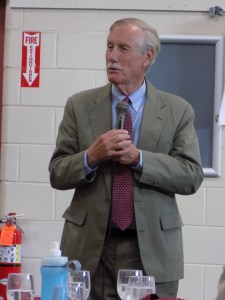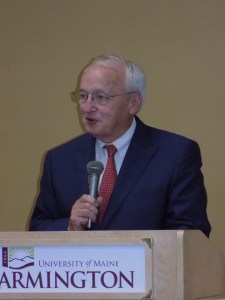FARMINGTON — In a daylong celebration Friday, Western Maine Community Action marked 50 years of service to people in Franklin, Androscoggin and Oxford counties, and honored retiring Executive Director Fenwick Fowler.
U.S. Sen. Angus King, I-Maine, told the 100-plus people at a luncheon that community action and the Office of Economic Opportunity was a radical notion at the time.
“The radical notion was that low-income people deserved a seat at the table. It was an ingenious idea,” he said, referring to the requirement for boards to be made up of one-third elected officials, one-third private business people and one-third people living in poverty.
“It’s still a model being used today,” he said.
The work WMCA does is very important, King said.
“What would this area look like without WMCA?” he asked.
The social service agency is dedicated to the principle that poverty should not be a permanent condition of people’s lives, according to its website. The majority of its services are designed to assist low- to moderate-income people with services that include nutrition, home ownership, heating and energy assistance, education and training, and employment and volunteerism.
King said success is all about good leadership. Good leaders need to have passion, have got to care and believe, he said.
“Fen is like that. You guys have made a real difference in people’s lives,” the former Maine governor said.
Later, at a social hour and history display at the UMF Emery Arts Center, Fowler spoke of the importance of keeping seniors independent as long as possible.
Maine native Kevin Concannon, undersecretary of the U.S. Department of Agriculture, keynoted the evening dinner, lauding Fowler for making a difference in people’s lives
“Fen has great compassion for the people in this part of the state,” Concannon said. “There are many thousands of people who may never know him by name but whose lives have been that much improved and affected by the work Western Maine (Community Action) has done.
Concannon said he has the good fortune to work in Washington where he oversees about 15 major nutrition programs.
He spoke of President Kennedy’s vow to do something about the poverty he saw in West Virginia while campaigning. Kennedy’s first action as president was to sign an Executive Order directing the USDA to create the food stamp program. In 1964, President Johnson signed it into law.
“Short of the Great Depression, nutrition programs are more needed now than ever,” Concannon said. He said many consider the recession over, but it’s not over for tens of millions of people and the evidence is in those nutrition programs.
“They are one of the strongest parts of a very frayed safety net,” Concannon said. Today, more eligible people are receiving benefits. He said large numbers of those eligible for food stamps are working.
“They either are not paid enough or can only get part time work,” Concannon said. Many people who once supported food banks now depend on them, he said.
Concannon also said that while the Gross Domestic Product has continued to rise since about 1980, the average income of Americans has flat lined.
“We need to do something about wage and wage opportunities because it affects children, adults and their choices,” he said.
Past WMCA President Ellen Grunblatt talked about the many ways Fowler is like a river and F. Celeste Branham, University of Maine at Farmington vice president for student and community services, presented Fowler with a grandfathers clock.
FARMINGTON — Kevin Concannon, undersecretary of the U.S. Department of Agriculture presented the following national nutrition statistics during the Western Maine Community Action 50th anniversary celebration Friday in Farmington.
* More than 2 million children in their first year of life are recipients of Women, Infants and Children program benefits.
* Nearly 46 million people were on food stamps in 2008.
* 83 percent of people eligible for food stamps receive those benefits.
* 31 percent of households eligible for food stamps are working.
* 42 percent of beneficiaries eligible are working.
* 59 percent of students at Deering High School in Portland are eligible for free and reduced-priced meals.
* 91 percent of students in Baltimore are eligible for free and reduced-price meals.
* 30 million students participate in the National School Lunch Program. Of those, 21 million are eligible for free or reduced meals.
* 99.5 percent of all public schools are enrolled in the National School Lunch Program. About 50 percent of private schools are enrolled.
* Nearly 14 million students have breakfast at school.
* 50,000 emergency feeding sites are available in the U.S.
* 30 percent of Americans between the ages of 17 and 24, male and female, are so overweight they don’t qualify for the military.



Comments are no longer available on this story